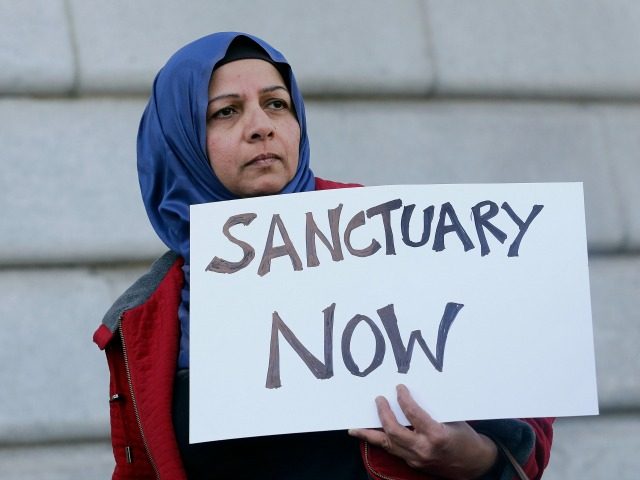U.S. District Judge Orlando Garcia granted Democrat-controlled Texas cities’ and open-borders groups’ request for a preliminary injunction blocking the Lone Star State’s tough new law against harboring illegal aliens Wednesday.
The 94-page order handed down in the U.S. District Court for the Western District of Texas in San Antonio, blocks certain sections of Texas Senate Bill 4 (SB4). Signed into law this May, SB4 adds tough civil and even criminal penalties for local government officials who frustrate the enforcement of immigration laws, for example by ignoring ICE “detainer” orders, when it takes effect in September. So-called “sanctuary” jurisdictions will no longer be allowed to issue policies preventing their law enforcement officers from cooperating with federal immigration authorities. The law also gives local law enforcement broad powers to inquire into the immigration status of their own detainees, and punishes jurisdictions that try to prevent them from doing so.
Liberal-run Texas municipalities like Dallas, Travis County (home to Austin), and the tiny border town of El Cenizo have joined forces with the American Civil Liberties Union and the League of United Latin American Citizens to fight the SB4, filing a suit that resulted in Wednesday’s order.
Judge Garcia’s preliminary injunction, which will remain in place while litigation continues, found the plaintiffs’ arguments that some aspects of the law were preempted by federal immigration laws under the U.S. Constitution’s Supremacy Clause were likely to succeed on the merits. While the court did not accept the plaintiffs’ contention that the entire law needed to be blocked, it did enjoin key aspects, including the program for local-federal cooperation on immigration enforcement and the prohibition on ignoring ICE detainers. Garcia also blocked the ban on instituting sanctuary policies on First Amendment grounds.
Sections allowing police to check on detainees’ immigration status are left intact, relying on the Supreme Court of the United States’s ruling on similar provisions in Arizona’s SB1070.
By Judge Garcia’s own reckoning, “[T]he Court’s role is limited to determining the constitutionality of a statute, not its wisdom or necessity.”
Yet Garcia also, in concluding, pointed out that, “[W]hen SB4 was being considered in the Senate, eight witneses showed up to support SB4 and over 1,600 witnesses showed up to oppose it,” and that, as he sees it, “There is overwhelming evidence by local officials, including local law enforcement, that SB4 will erode public trust and make many communities and neighborhoods less safe.”
“Today’s decision makes Texas’ communities less safe,” Texas Governor Greg Abbott, a strong supporter of SB4, said in a statement quoted by Dallas News. “Because of this ruling, gang members and dangerous criminals, like those who have been released by the Travis County Sheriff, will be set free to prey upon our communities.”
Detractors of the bill, by contrast, were jubilant at the decision. “It’s a win for the country,” Roger Rocha, president of the League of United Latin American Citizens, said in a written statement. “The ruling protects the civil liberties of immigrant communities across the U.S. that live in fear of discrimination due to the color of their skin, accent, and native country.”
Texas Attorney General Ken Paxton has vowed to keep up the fight to preserve SB4. “Senate Bill 4 was passed by the Texas Legislature to set a statewide policy of cooperation with federal immigration authorities enforcing our nation’s immigration laws,” he said in a statement his office released after the decision. “Texas has the sovereign authority and responsibility to protect the safety and welfare of its citizens. We’re confident SB 4 will ultimately be upheld as constitutional and lawful.”
The Texas AG’s office had hoped for the case to be consolidated with other challenges to SB4 and litigated in Austin, more favorable ground for the state government. Possibilities now include an appeal of Judge Garcia’s injunction to the U.S. Court of Appeals for the Fifth Circuit.
The case in question is City of El Cenizo v. Texas, SA-17-CV-404-OLG.

COMMENTS
Please let us know if you're having issues with commenting.